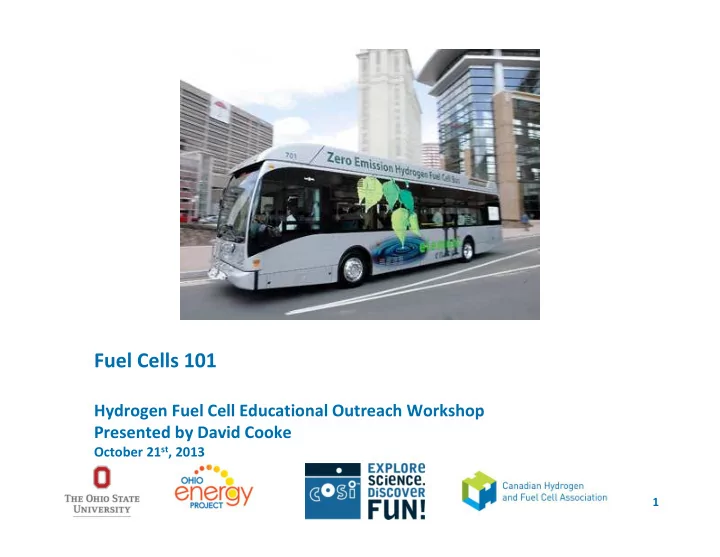

Fuel Cells 101 Hydrogen Fuel Cell Educational Outreach Workshop Presented by David Cooke October 21 st , 2013 1
Why are hydrogen and fuel cells important? • Hydrogen and fuel cells are technology solutions that are part of an integrated and sustainable energy system for future generations • Continued innovation in this sector advances national objectives of: – Economic development and job creation – Enhancing Canada’s science and technology capacity – Clean air (eliminates NO x , SO x , CO and particulates) – Greenhouse gas emission reduction – Reducing the carbon impact of Canada’s oil and gas resources 2
The Need For Energy 3
World Annual Energy Consumption in Terrawatts 4
How Can the Demand Be Met? Energy From Fossil Fuels Nuclear Energy Conservation and Efficiency Renewable Energy 5
6
7
8
9
10
11
12
13
14
15
16
17
Hydrogen Basics • Hydrogen is the universe's most common and simplest element. • As a fuel it provides benefits to energy security, the environment and economic growth. • Consisting of one proton and one electron, on earth it is found bonded to other elements (for example, when combined with oxygen, it forms water - H 2 O). • The global hydrogen industry is well established and produces 50 million tons of hydrogen per year. • Can be produced from fossil fuel-based feedstocks such as natural gas. • Can be produced from off-peak electricity from nuclear, solar, wind, tidal energy sources. • Can store off-peak energy produced by renewable energy technologies such as solar, wind and tidal generation. 18
Hydrogen Basics 19
Hydrogen Basics Protons have a + charge Electrons have a - charge 20
Where does hydrogen come from? Oxygen Hydrogen Solar Power Oxygen Fuel Cell Electrolysis Wind Power Water Water Power 21
Hydrogen Through The Years hydrogen Hydrogen Content Energy revolution natural gas Information revolution oil Automobile revolution Electricity revolution coal Industrial revolution wood 22
Hydrogen is a safe, efficient energy carrier that can be produced from multiple feedstocks Natural Gas Reformer Coal Reformer Crude Oil Reformer Nuclear Nuclear Electric Power Plant Solar Generator Hydro Generator Hydrogen Electrolyzer Wind Generator Wave Generator Geothermal Generator Wood Reformer Organic Waste Reformer Biomass Reformer Byproduct Purification Note: Canada safely produces 3 million tonnes of hydrogen per year 23
Hydrogen – Energy Storage • Energy Storage Will be a Focus of Future Energy Systems 24
The Fuel Cell • The invention is more than 150 years old Electrolyzer Grove’s gas battery (First Fuel Cell, 1839) 25
What is a fuel cell? • An electrochemical device that enables the chemical energy of a variety of fuels to be converted directly into electricity Benefits: • Superior energy efficiency • Multiple feedstocks: hydrogen, methanol, natural gas, formic acid, ethanol • Zero to near-zero emissions • Versatility – can be utilized in micro, portable, stationary, and mobile power applications • Low maintenance costs, quiet operation, flexibility for innovative designs 26
What is a fuel cell? 27
How a Fuel Cell Works • A fuel cell consists of two electrodes, the anode and the cathode, separated by a proton exchange membrane (PEM). • Hydrogen is blown over the anode and oxygen (from air) over the cathode. • When hydrogen reaches the catalyst layer, it separates into protons (hydrogen ions) and electrons. • The electrons freed at the anode, are conducted in the form of an electric current through the external circuit. • At the cathode, oxygen from the air, electrons from the external circuit and protons combine to form water and heat. Courtesy of Ballard Power 28
How a Fuel Cell Works 29
Hydrogen and fuel cells enable clean energy systems • They reduce the carbon impact of fossil fuels and supplement the intermittent nature of renewable energy sources. 30
Hands-On with a Fuel Cell Model Car • Most of the concepts that explain the basics of a solar power, hydrogen and fuel cells are covered with standard curriculum topics • We will be using the Heliocentris Dr FuelCell Model Car – A Curriculum based product focussed on teaching the science behind solar hydrogen fuel cells – Product is focussed on teaching the science curriculum • Designed for schools specifically • Known for Quality & Durability • Yours to keep after the workshop 31
What will we learn in the investigation? • How to produce hydrogen using solar energy • How to store hydrogen • How to use the hydrogen we have produced to run a fuel cell car • Some hydrogen fuel cell background 32
A Hydrogen System for a Fuel Cell Car The ‘Gas’ Station O2 The Fuel Cell Car DC Power O2 Electrolyzer H 2 Power DC Power Water Storage Generation H2 Water 33
A Hydrogen Fuel Cell Car Photo and Illustration by DaimlerChrysler 2004 Air filter Power electronics Hydrogen tanks Electric motor PEM fuel cell stack Water condenser Humidifier 34
35
36
37
Recommend
More recommend